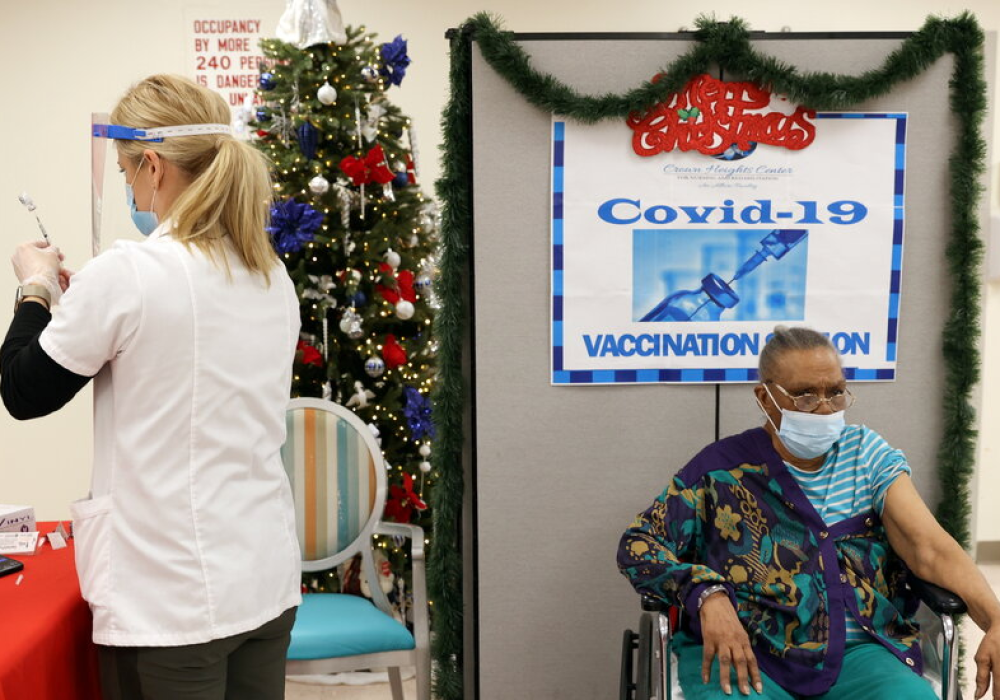At Sea Crest Nursing and Rehabilitation, a large nursing home that looks out on the Coney Island boardwalk, more than 100 residents have died of Covid-19 since the pandemic began.
Yet as a more contagious variant of the coronavirus surges to a new high in New York, the nursing home is struggling to provide what medical experts believe is one of the strongest forms of protection against this latest wave of the virus: a booster shot.
Of the 274 residents of the nursing home, only 52 — fewer than one in five — had received a booster, according to state data from this past week.
Vaccine hesitancy among residents or their families, and residents being ineligible because they recently received second vaccine doses or monoclonal antibodies are among the causes of the low booster rates at Sea Crest and other nursing homes.
But as Omicron spreads, health experts point to an additional problem: New York, like much of the country, was slow to push boosters before the new variant arrived a few weeks ago, and has largely left administering third doses to the long-term care facilities themselves, some of which are struggling with the task.
Now, with the new variant spreading rapidly in almost every region, health experts are calling on the city and state to do more to ensure that the most vulnerable — particularly nursing home residents — get boosters quickly.
New York reported 49,708 new cases on Dec. 24 and 36,454 on Christmas, more than any other state in the country, as Omicron continued to spread quickly across the nation, with infections also spiking in Washington, D.C., New Jersey, Puerto Rico and Florida.
“The city and state should be working together to try to make sure everyone in nursing homes is boosted,” said Dr. Tom Frieden, a former city health commissioner and former C.D.C. director. He called nursing homes “ground zero for Covid.”
Boosters for nursing home residents are considered vital during the Omicron surge because nursing home residents have had a significantly higher risk of dying from Covid-19 for much of the pandemic. Many nursing home residents were vaccinated in the early days of the vaccine campaign, and their immunity has waned, public health experts say.
At the same time, initial data and laboratory studies suggest that while the vaccines still provide significant protection against severe illness, they are much less effective at stopping the new variant from infecting people without a booster. Boosters are also expected to provide added protection against severe illness.
Already there have been several reports of outbreaks in nursing homes in the city and its suburbs, industry officials said. Since the pandemic began, there have been more than 14,000 coronavirus-related deaths of nursing home residents in New York State, while nationally, more than one-third of Covid-19 deaths during 2020 occurred among nursing home residents and employees.
Across New York City, about 56 percent of residents in nursing homes and assisted living facilities have received a booster shot, which is above the national rate of about 50 percent, according to data from the New York State Department of Health. But at dozens of facilities, less than half of the residents have received a booster. And at about 20 nursing homes, less than a quarter of residents have received a booster shot, according to the data.
In all, more than 19,000 residents in New York City nursing homes and assisted living facilities have not received a booster shot.
“It would be very surprising if we did not see excess mortality in the long-term care, institutionalized population that was not boosted,” said Dr. John Rowe, a professor of health policy and aging at the Columbia University Mailman School of Public Health.
And boosting more nursing home residents could help prevent hospitals from being overwhelmed in the weeks ahead, by lowering the number of severely ill patients. Many hospitals are already facing staffing shortages because of the pandemic as well as vaccine mandates that led thousands of employees to quit or be fired.
Thanks in part to mandates instituted by Mayor Bill de Blasio, some 72 percent of all New York City residents are fully vaccinated — higher than the national rate of 62 percent.
But even though it is again an epicenter for Covid infection, the city has not been swift about pushing residents to get boosters, or creating dedicated programs to assist nursing homes and other facilities to provide them. For example, the city did not extend its $100 incentive for getting vaccinated to include boosters until the past week.
Dec. 26, 2021, 5:48 p.m. ET
As of Wednesday, New York City has administered 1.85 million boosters, representing about 27 percent of the adult population. Across the country, about 25 percent of adults have received boosters.
When booster shots were authorized in September for people over 65, nursing homes in the state were told to make the shots available to residents. The state’s directive envisioned nursing homes administering the shots on their own or relying on pharmacies.
Some homes moved quickly and boosted most of their residents. But others made little progress. Hoping to raise the rate, the state Department of Health sent out a letter on Nov. 24, just as word of a new variant was emerging, reminding nursing homes that they needed to ensure that residents “have an opportunity to receive” a booster dose.
Given the current rate, several public health experts said that it was not enough to rely on nursing homes to vaccinate their own residents.
“Send in a team of health workers or mobilize the National Guard to vaccinate these people,” said Dr. Kitaw Demissie, dean of the School of Public Health at SUNY Downstate Medical Center in Brooklyn. “It would be very good to do that.”
Gov. Kathy Hochul has insisted that nursing homes are equipped to do the job of administering boosters. She has also suggested that the problem lies not with the nursing homes, but with resistant family members or residents who are unable to provide consent because of cognitive decline.
“The numbers are not where they should be,” she said on Friday.
The city’s health commissioner, Dave A. Chokshi, said on Dec. 19 that if any nursing homes lacked a pharmacy to administer boosters, the city would deploy vaccination teams. A health department spokesman said Saturday that the city had “arranged vaccination clinics for those that did not have pharmacy partners,” but did not provide any additional details.
The Coronavirus Pandemic: Key Things to Know
New treatments. The Food and Drug Administration authorized in short succession the first two pill treatments for Covid-19 from Pfizer and Merck. The new drugs, which can be taken at home with a doctor’s prescription, will be available to some Covid patients who are at higher risk of becoming severely ill.
Nursing homes have also struggled to vaccinate their staff members. Nursing homes lost more than 4,000 employees after New York’s vaccine mandate went into effect in late September, and many operators fear that requiring boosters will lead to more resignations.
Today, New York is among the lowest-ranked states for getting boosters into the arms of nursing home employees, with just 17 percent of those workers having gotten the shot. That is below the national average of 22 percent, according to the American Health Care Association, which represents 14,000 nursing homes and assisted living communities nationwide.
Industry officials say they are making progress with residents getting booster shots. The Greater New York Health Care Facilities Association, which analyzed state data, found that the more than 1,100 long-term care facilities across the state had held nearly 4,800 booster clinics on site and 619 booster clinics for residents at pharmacies or doctors’ offices as of mid-December.
The organization estimates that about 12 percent of fully vaccinated nursing home residents did not yet qualify for a booster because they had only recently received an earlier dose of the vaccine or monoclonal antibodies. Another 21 percent had either declined a booster or the nursing home had yet to receive consent from relatives.
“It’s an ongoing effort to encourage boosters,” said Stephen Hanse, president of the New York State Health Facilities Association, which represents 350 nursing homes across the state.
Nursing home operators said that given the Omicron surge, they believe limiting visitors is an even more critical issue than cajoling their residents and staff members to get boosters.
The Centers for Medicare & Medicaid Services now requires nursing homes to allow visitation because of the severe physical and emotional toll that isolation has had on residents. Those visitors do not need to be vaccinated to enter, though they must wear masks and pass a health screening.
But operators of nursing homes that have reported outbreaks recently say that visitors are bringing the virus into their facilities, said Michael Balboni, the executive director of the Greater New York Health Care Facilities Association. He said he knew of five nursing homes in New York City and its suburbs that have had recent outbreaks.
“I’m getting frantic calls from my operators,” Mr. Balboni said. “We should not have visitation. If the hospitals can limit visitation, why can’t we?”
In response to nursing home concerns, the Centers for Medicare & Medicaid Services issued a “clarification” on Dec. 23 that allows nursing homes to place some limits on visitation, such as staggering visit times, but they may not bar visitors completely.
To secure permission to boost more residents, nursing homes have begun trying new techniques, such as sending out mass texts to residents’ families telling them to call the facility if they want their relatives to get the booster.
At the Crown Heights Center for Nursing and Rehabilitation in Brooklyn, that strategy helped get about two dozen residents boosted at a vaccine clinic held Wednesday, the facility’s assistant director of nursing, Vanessa Dorsainvil, said. The home had also struggled to get all residents fully vaccinated, and its rate of booster shots was among the city’s lowest.
At Sea Crest Nursing in Coney Island, the staff is still trying to convince more residents to get the shot, said Mr. Balboni, who also serves as the spokesman for Sea Crest’s for-profit parent company, Cassena Care.
The nursing home, which had agreed to take in Covid-19 patients at an earlier point in the pandemic, has had a higher death toll than many other nursing homes during the pandemic. Mr. Balboni said the staff had encountered “cultural challenges” when trying to convince residents — many of whom are from Eastern Europe — to get a booster shot, because many families did not trust it.
“You can offer and offer it,” Mr. Balboni said. “But if you don’t want to take it, you don’t take it.”
James Thomas contributed reporting and Kirsten Noye contributed research.












